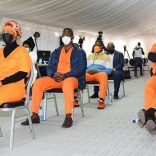Mozambique: Five police officers suspected of stealing 56Kg of gold, 900 grams of tourmalines - ...
Mozambican navy accused of failing to rescue research vessel attacked by terrorists – AIM report | Watch

Screen grab: Public Integrity Center
The Mozambican navy failed to go to the rescue of a Russian research vessel that came under attack from islamist terrorists on 10 May off the coast of the northern province of Cabo Delgado, according to a detailed report on the incident published by the anti-corruption NGO, the Centre for Public Integrity (CIP).
The Russian ship was undertaking research on Mozambique’s fisheries resources. It had travelled from Ponta de Ouro in the far south to Cabo Delgado. CIP cites one of the researchers, named, for security reasons, only as Joao, who was one of 40 occupants of the Russian vessel.
The ship was halted, analysing the environmental parameters of the water, near the Quirimbas archipelago, when the crew noted the approach of a boat, at around 15.00 on 10 May.
READ: Mozambique: Government investigates attack on Russian oceanographic vessel off Cabo Delgado
Mozambique: Terrorists attack Russian oceanographic vessel off Tambuzi island – AIM report
Initially, the team did not suspect that these were attackers “because we had received information that there would be a military patrol in that area”. However, matters changed when the team noted the characteristics of the occupants of the boat. “They were people dressed in casual clothes, but with masks, guns and machetes, and they were communicating in Arabic”, Joao said.
One of the researchers was about ten metres from the attackers and saw one of them point a gun at him. It was this that warned the other occupants of the danger. After the researcher spoke with the other occupants, and began the escape, the attackers started shooting. From the bullet holes, the ship’s occupants have no doubt that the attackers were shooting to kill.
The crew tried to throw off the attackers by moving the vessel further out to the high seas. But the seamen were terrified because the ship took some time to gain speed. A vídeo from the ship’s internal circuit shows the crew’s concern to control the movement of the attackers who were now in two boats. A bullet entered the cabin and hit a monitor screen.
Another video shows the attackers chasing the ship while continuing to shoot, even at the risk of causing a shipwreck. “They were in speedboats and showed that they were willing to immobilise the ship. They fired several shots to damage the ship”, recalled João.
During the escape, the crew asked the Mozambican navy for assistance. “We rang the Cabo Delgado navy captain who promised to send two helicopters, but that aid did not arrive”, said Joao. But the attackers seemed determined to stop the ship, in a pursuit that lasted for about 20 minutes. According to João, the attackers eventually gave up the chase, because of the rough seas, which posed a risk of shipwreck.
The following night, according to Joao, “Nobody slept. We were all nervous because we did not know whether they (the attackers) had the capacity to locate us. So the crew decided to switch off the radar so that the ship would not be identified. This device was only switched on to control nearby vessels. We only felt calm when we left the Pemba area”, he recalled.
No other vessels responded to the Russian ship’s requests for help. The crew was particularly frustrated by the lack of action from the defence and security authorities. “They promised to send two helicopters to help but they did not arrive”, said Joao. “On the morning of the following day, we began to receive calls from the captain asking for our location. Up to today, we don’t understand why we were abandoned. They allege they didn’t send help because our ship was not visible on the radar, but they could have contacted us in the same way that we contacted them”.
The research team accuses the National Maritime Institute (INAMAR) and the Ministry of Defence of negligence. It says that these two bodies were consulted about the route that would be followed by the researchers, but they did not warn the team about any risk of attack in that zone.
Ten days passed between the date of the attack and the first reaction of the Council of Ministers, but even so the Government said it had no relevant information about what happened off the coast of Cabo Delgado. The government spokesperson. Inocêncio Impissa, the Minister of State Administration, said the situation was still being investigated.
CIP says it learnt that a team from the Navy questioned the researchers and the ship’s crew on 17 May, the date of their arrival in Maputo.
Using the Freedom of Information law, CIP has sent letters to the Defence Ministry and to INAMAR, asking for comment on the accusation of negligence. CIP wanted to know what actions the Mozambican authorities took to rescue the research team, and what is being done to prevent similar episodes in the future.
So far CIP has not received any reply.












Leave a Reply
Be the First to Comment!
You must be logged in to post a comment.
You must be logged in to post a comment.